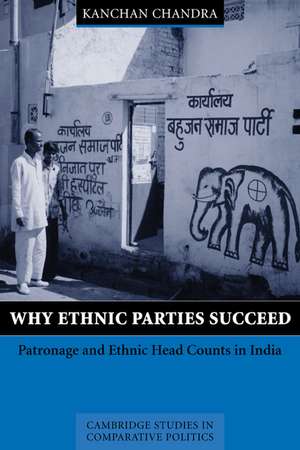Why Ethnic Parties Succeed: Patronage and Ethnic Head Counts in India: Cambridge Studies in Comparative Politics
Autor Kanchan Chandraen Limba Engleză Paperback – 14 feb 2007
| Toate formatele și edițiile | Preț | Express |
|---|---|---|
| Paperback (1) | 322.89 lei 6-8 săpt. | |
| Cambridge University Press – 14 feb 2007 | 322.89 lei 6-8 săpt. | |
| Hardback (1) | 817.86 lei 6-8 săpt. | |
| Cambridge University Press – 21 mar 2004 | 817.86 lei 6-8 săpt. |
Din seria Cambridge Studies in Comparative Politics
-
 Preț: 179.15 lei
Preț: 179.15 lei -
 Preț: 267.61 lei
Preț: 267.61 lei -
 Preț: 239.36 lei
Preț: 239.36 lei - 9%
 Preț: 594.67 lei
Preț: 594.67 lei -
 Preț: 160.82 lei
Preț: 160.82 lei -
 Preț: 269.58 lei
Preț: 269.58 lei -
 Preț: 264.74 lei
Preț: 264.74 lei -
 Preț: 177.28 lei
Preț: 177.28 lei -
 Preț: 225.70 lei
Preț: 225.70 lei -
 Preț: 164.94 lei
Preț: 164.94 lei -
 Preț: 236.42 lei
Preț: 236.42 lei -
 Preț: 185.64 lei
Preț: 185.64 lei -
 Preț: 233.13 lei
Preț: 233.13 lei -
 Preț: 206.71 lei
Preț: 206.71 lei -
 Preț: 231.82 lei
Preț: 231.82 lei -
 Preț: 206.52 lei
Preț: 206.52 lei -
 Preț: 201.24 lei
Preț: 201.24 lei -
 Preț: 358.37 lei
Preț: 358.37 lei -
 Preț: 203.42 lei
Preț: 203.42 lei -
 Preț: 232.45 lei
Preț: 232.45 lei -
 Preț: 257.82 lei
Preț: 257.82 lei -
 Preț: 191.12 lei
Preț: 191.12 lei -
 Preț: 158.77 lei
Preț: 158.77 lei -
 Preț: 199.05 lei
Preț: 199.05 lei - 11%
 Preț: 553.80 lei
Preț: 553.80 lei - 11%
 Preț: 695.06 lei
Preț: 695.06 lei -
 Preț: 288.80 lei
Preț: 288.80 lei -
 Preț: 262.06 lei
Preț: 262.06 lei - 11%
 Preț: 691.66 lei
Preț: 691.66 lei -
 Preț: 388.29 lei
Preț: 388.29 lei -
 Preț: 288.04 lei
Preț: 288.04 lei -
 Preț: 228.00 lei
Preț: 228.00 lei -
 Preț: 385.28 lei
Preț: 385.28 lei -
 Preț: 312.89 lei
Preț: 312.89 lei -
 Preț: 224.44 lei
Preț: 224.44 lei -
 Preț: 287.07 lei
Preț: 287.07 lei -
 Preț: 251.27 lei
Preț: 251.27 lei -
 Preț: 313.70 lei
Preț: 313.70 lei -
 Preț: 277.38 lei
Preț: 277.38 lei -
 Preț: 423.79 lei
Preț: 423.79 lei - 11%
 Preț: 552.94 lei
Preț: 552.94 lei - 11%
 Preț: 554.43 lei
Preț: 554.43 lei - 14%
 Preț: 783.26 lei
Preț: 783.26 lei
Preț: 322.89 lei
Nou
Puncte Express: 484
Preț estimativ în valută:
61.80€ • 64.27$ • 51.71£
61.80€ • 64.27$ • 51.71£
Carte tipărită la comandă
Livrare economică 15-29 martie
Preluare comenzi: 021 569.72.76
Specificații
ISBN-13: 9780521891417
ISBN-10: 0521891418
Pagini: 368
Ilustrații: 17 b/w illus. 7 maps 39 tables
Dimensiuni: 151 x 227 x 20 mm
Greutate: 0.54 kg
Ediția:Revised
Editura: Cambridge University Press
Colecția Cambridge University Press
Seria Cambridge Studies in Comparative Politics
Locul publicării:New York, United States
ISBN-10: 0521891418
Pagini: 368
Ilustrații: 17 b/w illus. 7 maps 39 tables
Dimensiuni: 151 x 227 x 20 mm
Greutate: 0.54 kg
Ediția:Revised
Editura: Cambridge University Press
Colecția Cambridge University Press
Seria Cambridge Studies in Comparative Politics
Locul publicării:New York, United States
Cuprins
List of maps; figures, and tables; List of abbreviations; A note on terminology; Acknowledgments; 1. Introduction; Part I. Theory: 2. Limited information and ethnic categorization; 3. Patronage-democracy, limited information and ethnic favouritism; 4. Counting heads: why ethnic parties succeed in patronage-democracies; 5. Why parties have different ethnic head counts: party organization and elite incorporation; Part II. Data: 6. India as a patronage-democracy; 7. The Bahujan Samaj Party (BSP) and the Scheduled Castes (SCs); 8. Why SC elites join the BSP; 9. Why SC voters prefer the BSP; 10. Why SC voter preferences translate into BSP votes; 11. Explaining different head counts in the BSP and congress; 12. Extending the argument to other ethnic parties in India: the BJP, the DMK and the JMM; 13. Ethnic head counts and democratic stability; Appendices; Bibliography; Index.
Recenzii
'Kanchan Chandra is one of the brightest lights in the new generation of political scholars of India. Chandra's contribution to ethnic studies is her challenge to the pessimistic premise advanced by leading scholars of ethnic politics that ethnic solidarities, unlike class and interest groups, are incompatible with and destructive of democratic processes. In her view, competition among ethnic minorities can lead to centrism and democratic survival rather than extremism and democratic destruction. She argues her case in game theoretic form while showing a good feel for the nitty gritty of Indian electoral settings.' Susanne Hoeber Rudolph, University of Chicago
'In explaining why some ethnic parties succeed while others fail, Kanchan Chandra makes an important contribution to our understanding of ethnicity in politics. By highlighting the interaction of group size and internal party rules in a context characterized by the kind of information constraints inherent in patronage democracies, she provides a nover microfoundation for ethnic politics in competitive democracies. In addition, her book sets a new benchmark on how to combine abstract thinking and rich analysis.' Stathis N. Kalyvas, Yale University
'In explaining why some ethnic parties succeed while others fail, Kanchan Chandra makes an important contribution to our understanding of ethnicity in politics. By highlighting the interaction of group size and internal party rules in a context characterized by the kind of information constraints inherent in patronage democracies, she provides a nover microfoundation for ethnic politics in competitive democracies. In addition, her book sets a new benchmark on how to combine abstract thinking and rich analysis.' Stathis N. Kalyvas, Yale University
Descriere
Offers a theory on the performance of ethnic political parties as a distinct phenomenon.














